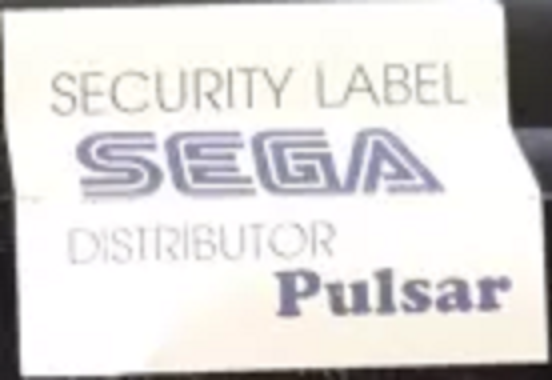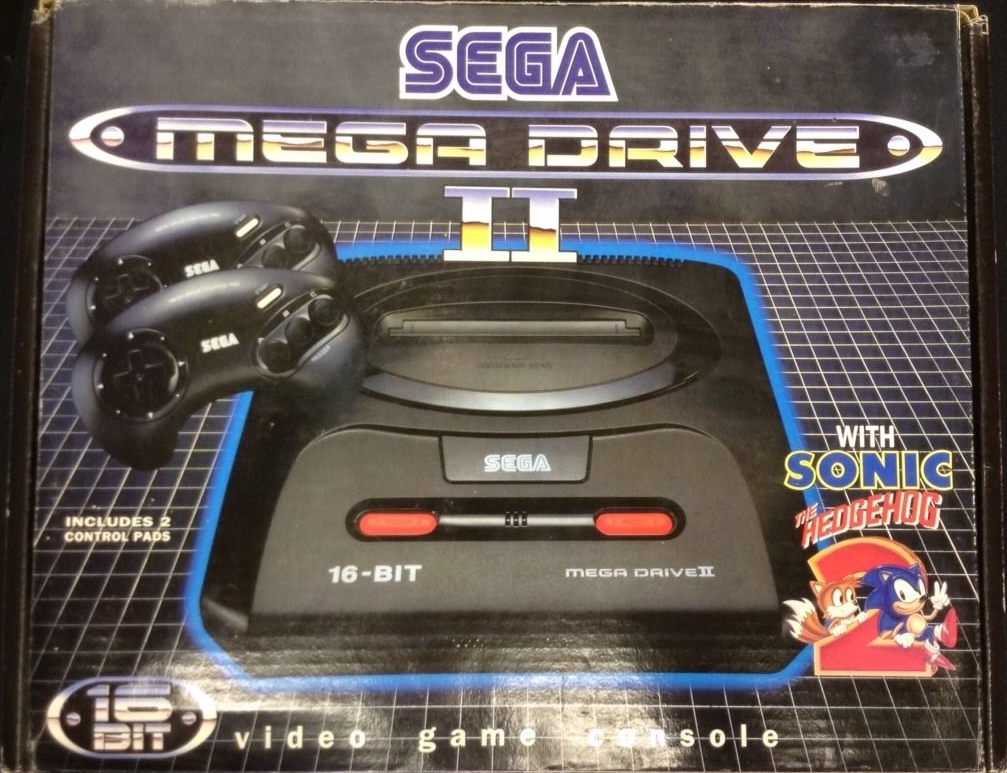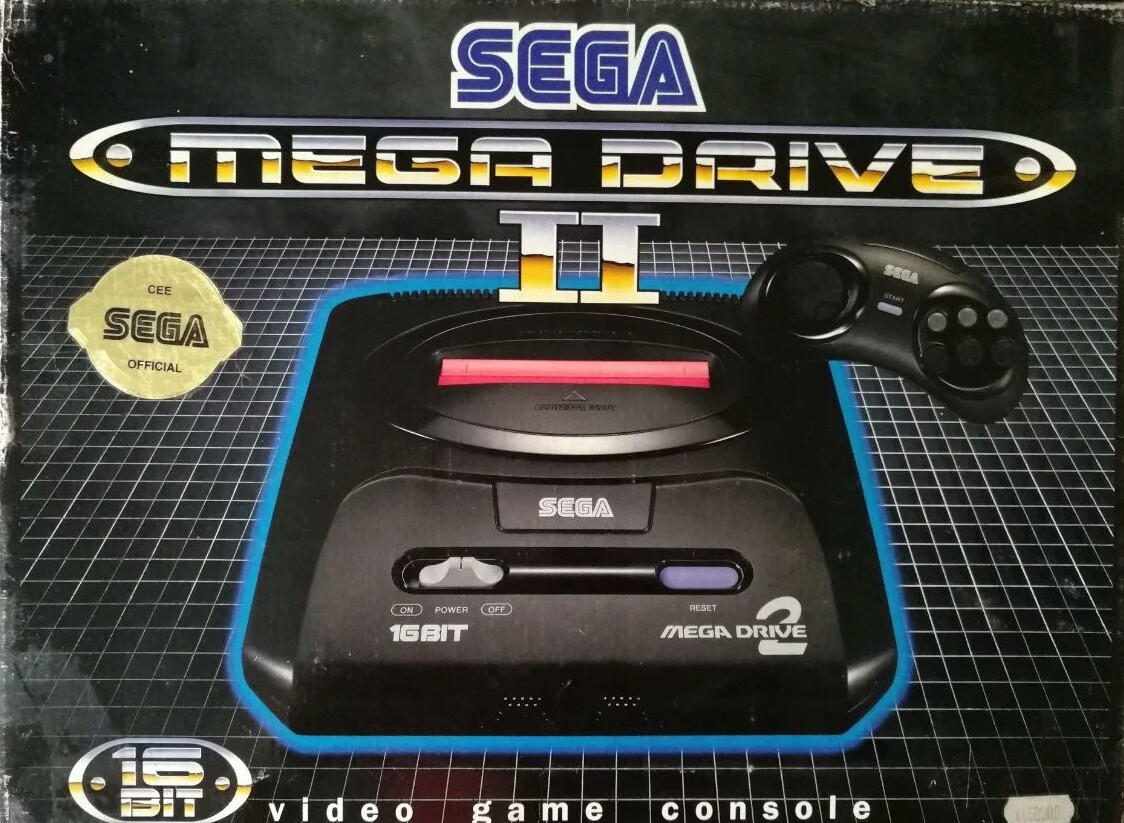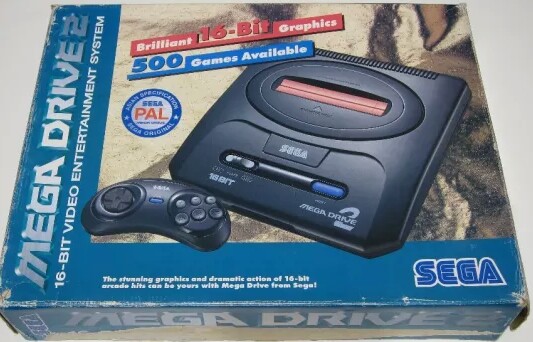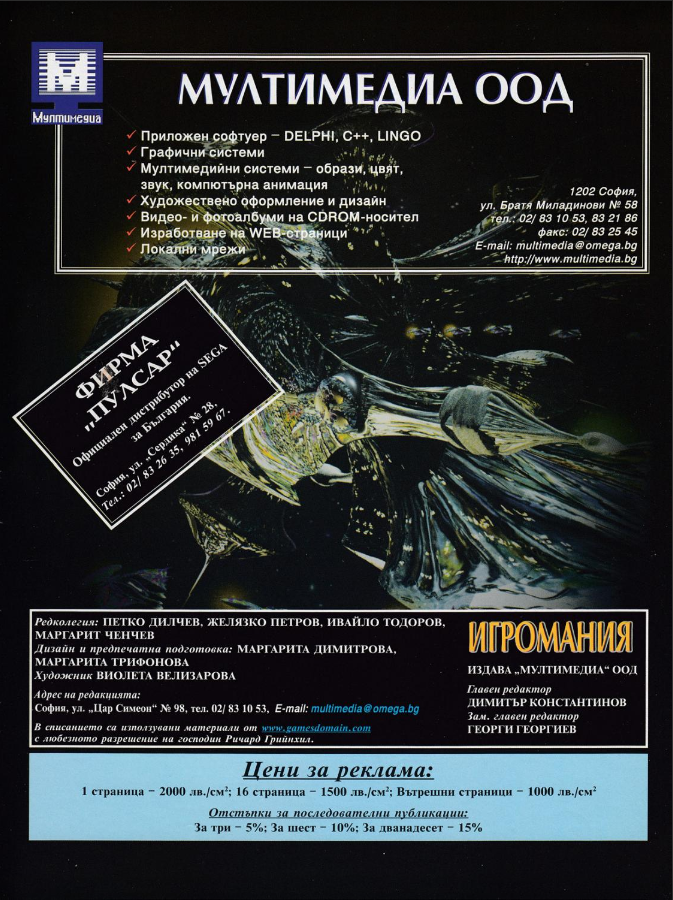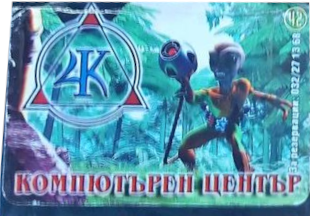Difference between revisions of "History of Sega in Bulgaria"
From Sega Retro
| (16 intermediate revisions by the same user not shown) | |||
| Line 3: | Line 3: | ||
| image=Notavailable.svg | | image=Notavailable.svg | ||
| title= | | title= | ||
| − | | distributors=[[Pulsar (company)|Pulsar]] (1994-2019), [[CD Media]] ( | + | | distributors=[[Pulsar (company)|Pulsar]] (1994-2019), [[CD Media]] (2019-present) |
| ratingsboard= | | ratingsboard= | ||
}} | }} | ||
{{stub}} | {{stub}} | ||
| − | + | The consoles existed in communist Bulgaria and an example is TV Sport produced by Plovdiv. Unfortunately, foreign consoles were practically unavailable. Mass demonstrations in November and December 1989 influenced the creation of a democratic parliamentary republic and the first free elections were held on October 13, 1991. This allowed the country to open up to foreign companies. | |
| − | In the early 1990s, the | + | In the early 1990s, [https://qph.cf2.quoracdn.net/main-qimg-2c81b25b1029681c24dc655bdc2b2fc3-lq Rambo TV Game], a [[Atari 2600]] clone, was released and became the first more known console, that was quickly replaced by famiclones like [https://4.bp.blogspot.com/-iQhTkm2mtUA/WZ9Jb36eQXI/AAAAAAAAKbg/Ir-Ya_Sk2-0Uzux1BsMV5irZ3Nq8xK-fQCEwYBhgL/s1600/terminator%2B2%2Bcon%2Bcaja.jpg Terminator 2], the most popular of this clones, which box design resemble [[Sega Mega Drive]] 2. The lack of [[Nintendo]] and [[Sega]] on the market made this console unrivaled. |
| − | In 1994, [[Pulsar (company)|Pulsar]] became a Sega distributor in Bulgaria and began distributing Mega Drive II, [[Master System]] II and [[Game Gear]]. Each product had an English sticker underneath saying ''Security Label SEGA Distributor Pulsar''. | + | In 1994, [[Pulsar (company)|Pulsar]] became a Sega distributor in Bulgaria and began distributing Mega Drive II, [[Master System]] II and [[Game Gear]] in European PAL system. Each product had an English sticker underneath saying ''Security Label SEGA Distributor Pulsar''. European version of Mega Drive II sold with 2 control pads and ''[[Sonic 2]]'' was quite expensive, so Sega began to supply cheaper PAL Asian models in order to lower price for around 20%. So now, they distributed Mega Drive 2 in Asian PAL (console + 1 or 2 pads) along Mega Drive II European PAL (console + 2 pad + Sonic 2). From 1995, Pulsar brought Mega CD 2 in Asian PAL (console inside) along Mega CD II in European PAL (console + ''[[Road Avenger]]'') and Mega Drive 32X in Asian/European PAL. |
| − | + | 16-bit Sega quickly became the second most popular console in Bulgaria. Besides Famicom and Mega Drive clones, Sega had competition in form of [[Super Nintendo]], [[Game Boy]] and [[Nintendo Entertainment System]] (distributed from 1994 by R&S)<ref>Pif Comics "Naĭ dobrite igrayat Nintendo"</ref>, [[Nintendo 64]] (distributed from 1997 by Nortec Multimedia), [[PlayStation]] (distributed from October 1996<ref>http://web.archive.org/web/19980703064424/http://www.playstation-europe.com/playstation/pr/launch.htm</ref> by Sony Bulgaria) and [[3DO]]. In 1996, [[Sega Saturn]] was released in Bulgaria, but wasn't as popular as the Mega Drive, which was sold here until the end of 1999. In June 1998, the [[Mortal Kombat 3 Ultimate Tournament]] took place in Sofia, which was the last major Mega Drive event in the country. | |
| − | [[ | + | The popularity of the Mega Drive console motivate many to distribute clones, which in addition to those being 16 bit fakes, were also [[Unlicensed_Mega_Drive_clones_(Famiclone_models)#Mega_Drive_2_shell|famiclones that looked like Mega Drive]]. Pirate games were quite popular and companies like [[WEN-BC]] signed an agreement with Chinese companies for the production of unlicensed cartridges for Mega Drive and Terminator 2, and then distributed them in Bulgaria, through local retailers. From 1996, WEN started a distribution of it's own branded [[Unlicensed_Mega_Drive_clones_(Mega_Drive_2)#Mega_Drive_2 (WEN-BC)|Mega Drive 2 clone]]. Another compnay called [[Balkan Tronics]], which sold Sega and Famicom games in special packaging, released "successors" of both consoles - [https://cloud10.todocoleccion.online/videojuegos-consola-megadrive/tc/2017/02/19/12/76747843.jpg Terminator 3] and [[Ranbo ABL AA1000|Mega Drive 3]]. Bootlegs were still distribute in 2000s, mostly on flea markets and by small electronic stores. The consoles like [[Extreme Land Mega Drive 2]] were sold at the time with the price of 40 BGN.<ref>http://hirudov.com/sega/ExtremeLand.php</ref>. There were also consoles imitating Mega Drive, such as the famiclone reminiscent of the [[Unlicensed_Mega_Drive_clones_(Famiclone_models)#Mega_Drive_2_shell|Mega Drive in a green box from Asian distribution]]. |
| − | Pulsar distributed Sega games<ref>https://mallofsofia.bg/store/pulsar/</ref> until the 2019 when they become a part of Ozon group | + | Sega arcades were distributed from at least late-90s by [[Deith Leisure Bulgaria]]. [[Sega Dreamcast]] (EU PAL) was sold by Pulsar<ref>List of websites including Pulsar as video game distributor http://lesnota.com/Drugi/E-Comerce2.htm</ref> from 2000, but [[PlayStation 2]] (distributed from December 2000 by Sony Bulgaria) was much more popular. |
| + | |||
| + | Pulsar distributed Sega games<ref>https://mallofsofia.bg/store/pulsar/</ref> until the 2019 when they become a part of Ozon group and began to cooperate with [[CD Media]], which grap the distributor license for Sega games.<ref>http://web.archive.org/web/20200722002854/https://cdmediase.eu/partnerships.html</ref> | ||
Nowadays [[Playground]] is an exclusive distributor of Sega Amusements Europe.<ref>http://www.isu.bg/main.aspx?lang=en&f=81&d=163</ref> | Nowadays [[Playground]] is an exclusive distributor of Sega Amusements Europe.<ref>http://www.isu.bg/main.aspx?lang=en&f=81&d=163</ref> | ||
| Line 25: | Line 27: | ||
{{gallery | {{gallery | ||
| − | |{{gitem| | + | |{{gitem|Security Label Pulsar.png|Security label |
| + | }} | ||
| + | |{{gitem|SMD2S2 EU Box Front.jpg|European Mega Drive II | ||
| + | }} | ||
| + | |{{gitem|MD2 1P Asia PAL box front.jpg|Asian Mega Drive II, release to the market in order to lower price, was quickly copied by pirates | ||
| + | }} | ||
| + | |{{gitem|MD2 Asia PAL Green Box Front.jpg|Other model also copied by pirates}} | ||
| + | |{{gitem|Sega Bulgaria.jpg|Advert from magazine saying ''Pulsar company, official distributor of Sega in Bulgaria'' | ||
}} | }} | ||
|{{galleryPrintAd|pif|5.95| | |{{galleryPrintAd|pif|5.95| | ||
}} | }} | ||
| − | |{{gitem | + | |{{gitem|Bootleg KompyutŭrenTsentŭr MD BG Cart.png|One of the rare bootlegs with translated art into Bulgarian from 2000s. Most of the copied games had English or Chinese labels. The background about this cart is unknown |
| − | | | ||
| − | |||
| − | |||
}} | }} | ||
}} | }} | ||
Latest revision as of 16:29, 24 April 2024

|
| History of Sega in Bulgaria |
|---|
| Official Sega distributor(s): Pulsar (1994-2019), CD Media (2019-present) |
This short article is in need of work. You can help Sega Retro by adding to it.
The consoles existed in communist Bulgaria and an example is TV Sport produced by Plovdiv. Unfortunately, foreign consoles were practically unavailable. Mass demonstrations in November and December 1989 influenced the creation of a democratic parliamentary republic and the first free elections were held on October 13, 1991. This allowed the country to open up to foreign companies.
In the early 1990s, Rambo TV Game, a Atari 2600 clone, was released and became the first more known console, that was quickly replaced by famiclones like Terminator 2, the most popular of this clones, which box design resemble Sega Mega Drive 2. The lack of Nintendo and Sega on the market made this console unrivaled.
In 1994, Pulsar became a Sega distributor in Bulgaria and began distributing Mega Drive II, Master System II and Game Gear in European PAL system. Each product had an English sticker underneath saying Security Label SEGA Distributor Pulsar. European version of Mega Drive II sold with 2 control pads and Sonic 2 was quite expensive, so Sega began to supply cheaper PAL Asian models in order to lower price for around 20%. So now, they distributed Mega Drive 2 in Asian PAL (console + 1 or 2 pads) along Mega Drive II European PAL (console + 2 pad + Sonic 2). From 1995, Pulsar brought Mega CD 2 in Asian PAL (console inside) along Mega CD II in European PAL (console + Road Avenger) and Mega Drive 32X in Asian/European PAL.
16-bit Sega quickly became the second most popular console in Bulgaria. Besides Famicom and Mega Drive clones, Sega had competition in form of Super Nintendo, Game Boy and Nintendo Entertainment System (distributed from 1994 by R&S)[1], Nintendo 64 (distributed from 1997 by Nortec Multimedia), PlayStation (distributed from October 1996[2] by Sony Bulgaria) and 3DO. In 1996, Sega Saturn was released in Bulgaria, but wasn't as popular as the Mega Drive, which was sold here until the end of 1999. In June 1998, the Mortal Kombat 3 Ultimate Tournament took place in Sofia, which was the last major Mega Drive event in the country.
The popularity of the Mega Drive console motivate many to distribute clones, which in addition to those being 16 bit fakes, were also famiclones that looked like Mega Drive. Pirate games were quite popular and companies like WEN-BC signed an agreement with Chinese companies for the production of unlicensed cartridges for Mega Drive and Terminator 2, and then distributed them in Bulgaria, through local retailers. From 1996, WEN started a distribution of it's own branded Mega Drive 2 clone. Another compnay called Balkan Tronics, which sold Sega and Famicom games in special packaging, released "successors" of both consoles - Terminator 3 and Mega Drive 3. Bootlegs were still distribute in 2000s, mostly on flea markets and by small electronic stores. The consoles like Extreme Land Mega Drive 2 were sold at the time with the price of 40 BGN.[3]. There were also consoles imitating Mega Drive, such as the famiclone reminiscent of the Mega Drive in a green box from Asian distribution.
Sega arcades were distributed from at least late-90s by Deith Leisure Bulgaria. Sega Dreamcast (EU PAL) was sold by Pulsar[4] from 2000, but PlayStation 2 (distributed from December 2000 by Sony Bulgaria) was much more popular.
Pulsar distributed Sega games[5] until the 2019 when they become a part of Ozon group and began to cooperate with CD Media, which grap the distributor license for Sega games.[6]
Nowadays Playground is an exclusive distributor of Sega Amusements Europe.[7]
Atgames product were distirbuted here by Kaseta-Tsentŭr[8] and Pulsar.
References
- ↑ Pif Comics "Naĭ dobrite igrayat Nintendo"
- ↑ http://web.archive.org/web/19980703064424/http://www.playstation-europe.com/playstation/pr/launch.htm
- ↑ http://hirudov.com/sega/ExtremeLand.php
- ↑ List of websites including Pulsar as video game distributor http://lesnota.com/Drugi/E-Comerce2.htm
- ↑ https://mallofsofia.bg/store/pulsar/
- ↑ http://web.archive.org/web/20200722002854/https://cdmediase.eu/partnerships.html
- ↑ http://www.isu.bg/main.aspx?lang=en&f=81&d=163
- ↑ https://quosub.tutkrabov.net/articles/sega-genesis-momche-za-vsichko-konzola-pregledate.html

